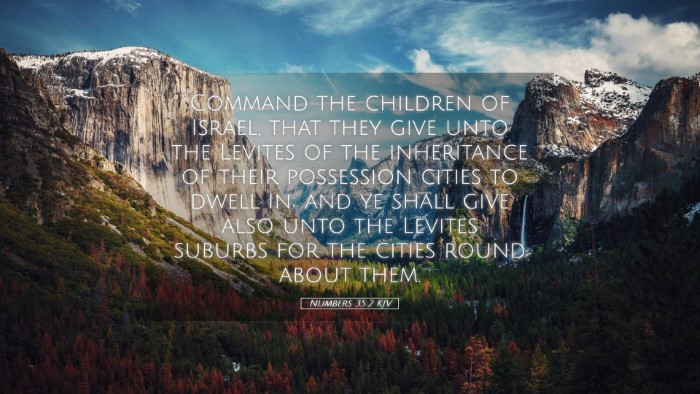Commentary on Numbers 35:2
Numbers 35:2 states: "Command the children of Israel that they give unto the Levites of the inheritance of their possession cities to dwell in; and ye shall give also unto the Levites suburbs for the cities round about them."
This passage outlines God's directive concerning the Levites, who were set apart for service in the sanctuary. This portion of scripture provides critical insights about the organization of Israelite society and the importance of the Levitical priesthood.
1. Significance of the Levites
The Levites were not given a share of land like the other tribes; instead, they were appointed for service in the Tabernacle (or Temple), making them distinct within Israelite society. Their role was foundational for worship and religious practice.
Matthew Henry emphasizes that the Levites were assigned to a special ministry, and through the allocation of cities, God made provisions for their physical sustenance while they focused on their spiritual duties. The Levites represented a spiritual connection between God and the people, highlighting the necessity of dedicated service to ensure that worship could occur without distraction.
2. The Cities and Suburbs
The command to give cities and suburbs to the Levites signifies the integration of the religious leadership into the community. Albert Barnes notes that the cities provided them with a dwelling place, while the suburbs allowed them land for herbs and livestock, facilitating both their sustenance and their presence among the people.
-
Preservation of the Spiritual Community: The proximity of the Levites to the other tribes ensured that spiritual guidance was readily accessible. The Levites, by being scattered throughout Israel, could exercise their teaching and intercessory roles in various communities.
-
Support for the Priestly Duties: By allocating suburbs, the passage indicates a means by which the Levites could support their duties without economic distractions. Adam Clarke adds that this arrangement allowed them enough resources to fulfill their roles effectively, thus maintaining the integrity of worship.
3. Theological Implications
This passage illuminates several theological principles. First, it reaffirms God’s sovereignty over His people and their allocations. The Levites’ service reflects the wider principle of holiness and separation for divine service.
Matthew Henry draws attention to the principle of God providing for those who serve Him. The Levites, while not owning land as others did, were guaranteed God's provision because of their dedication to His service. This reinforces the idea that in God's economy, service and holiness lead to divine provision.
4. Practical Applications
For today’s pastors and church leaders, the principle of the Levites speaks to the importance of supporting those who are dedicated to spiritual ministry. Churches are encouraged to provide for their leaders, ensuring they can focus on their primary spiritual responsibilities.
Albert Barnes remarks that this divinely ordained structure is vital for the health of the Spiritual community. It suggests modern applications such as equitable financial support, mentorship, and nurturing environments that allow ministry leaders to thrive in their calling.
5. Conclusion
Numbers 35:2 provides a rich tapestry of insight into the relationship between the Israelites and the Levites, reminding us of the importance of dedicated service, the basis for provision, and the structure necessary for spiritual community life. The insights from Matthew Henry, Albert Barnes, and Adam Clarke underscore the enduring relevance of this passage for contemporary believers, challenging us to honor and support those called to serve in ministry.


